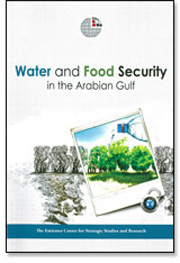Book contents
- Frontmatter
- Contents
- Figures and Tables
- Abbreviations and Acronyms
- Foreword
- Introduction
- Keynote Addresses
- Water Security in a Changing World
- Water Security in the Arabian Gulf Region
- Water Resource Management in the Arabian Gulf Region
- Regional and International Food Security
- 7 Challenges Facing Global Food Supplies
- 8 Food Security Strategies in the Arabian Gulf Region
- Water and Food Security in the UAE
- Contributors
- Notes
- Bibliography
- Index
7 - Challenges Facing Global Food Supplies
from Regional and International Food Security
Published online by Cambridge University Press: 05 September 2014
- Frontmatter
- Contents
- Figures and Tables
- Abbreviations and Acronyms
- Foreword
- Introduction
- Keynote Addresses
- Water Security in a Changing World
- Water Security in the Arabian Gulf Region
- Water Resource Management in the Arabian Gulf Region
- Regional and International Food Security
- 7 Challenges Facing Global Food Supplies
- 8 Food Security Strategies in the Arabian Gulf Region
- Water and Food Security in the UAE
- Contributors
- Notes
- Bibliography
- Index
Summary
“Unprecedented challenges require unprecedented solutions.”
— Amin MaaloufThe global economic development that has occurred over the past 50 years has substantially improved human well being, but it has also created unprecedented social, economic and environmental problems. Furthermore, interdependencies among nations and economies have created new risks and vulnerabilities, as demonstrated by the recent food and financial crises.
Today's world is undergoing a major transformation characterized by increased globalization, fundamental shifts in economic and political power, growing global environmental problems, and potentially explosive social conflicts. The past decade alone has reversed a 100-year decline in resource prices as demand for commodities has surged. The volatility of resource prices today is at an all-time high; the era of cheap food is over. Indeed, the price and volatility of different resources have developed increasingly tight links over the past ten years. Shortages and price changes in one resource can rapidly impact other resources. In this context the correlation between food prices and energy prices is now higher than at any point in the past century because of biofuels, fertilizer and transport costs.
The world has also experienced several, sometimes unexpected shocks. These include the rise in energy prices in 2008 and 2010, and concerns about energy security; related food and commodity price rises; worries about water and food security and how to feed 9 billion people by 2050; declining ecosystem services and the global economic recession.
- Type
- Chapter
- Information
- Water and Food Security in the Arabian Gulf , pp. 159 - 174Publisher: Emirates Center for Strategic Studies and ResearchPrint publication year: 2013



